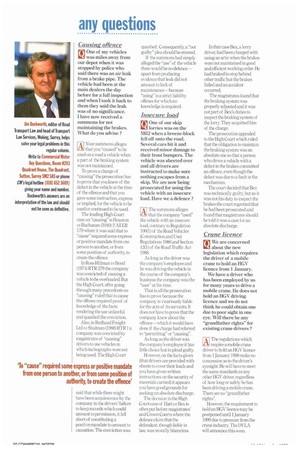A The summons alleges
Page 62

If you've noticed an error in this article please click here to report it so we can fix it.
that the company "used" the vehicle with an insecure load, contrary to Regulation 100(1) of the Road Vehicles (Construction and Use) Regulations 1986 and Section 42(1) of the Road Traffic Act 1988.
As long as the driver was the company's employee and he was driving the vehicle in the course of the company's business the company was the "user" at the time.
That is all the prosecution has to prove because the company is vicariously liable for the acts of its servants. It does not have to prove that the company knew about the offence—which it would have done if the charge had referred to "permitting" or "causing'.
As long as the driver was the company's employee it has little choice but to plead guilty.
However, on the facts given (that drivers are provided with sheets to cover their loads and you have given written instructions on the security of materials carried) it appears you have good grounds for seeking an absolute discharge.
The decision in the High Court case of Hart vs 13ex is often put before magistrates' and Crown Courts where the defence claim that the defendant, though liable in law, was morally blameless. In that case Bex, a lorry driver, had been charged with using an artic when the brakes were not maintained in good and efficient working order. He had braked to stop behind other traffic but the brakes failed and an accident occurred.
The magistrates found that the braking system was properly adjusted and it was not part of Bex's duties to inspect the braking system of the lorry. They acquitted him of the charge.
The prosecution appealed to the High Court which ruled that the obligation to maintain the braking system was an absolute one so that a person who drove a vehicle with a defect in the brakes committed an offence, even though the defect was due to a fault in the mechanism.
The court decided that Bex was technically guilty, but as it was not his duty to inspect the brakes the court regretted that he had been prosecuted and found that magistrates should be told it was a case for an absolute discharge.




























































































































